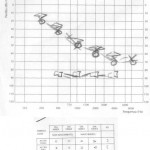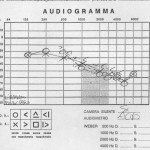
In a previous article we discussed the difference between being blind and being visually impaired. For the ‘lucky‘ people with Usher Syndrome the problem are double. Not only your eyes do not work, but also ears. If Usher Syndrome Type I is basically deafblindness, those with Type II are not necessarily blind nor deaf.
Visually impaired and hearing impaired. Ipo from the ancient greek ὑπό, hypó, under
In my case it is bilateral congenital hearing loss, or difficulty hearing in both ear ssince birth. Beyond words, if the sight of a person with Usher Syndrome Type II is likely to deteriorate more or less quickly the hearing loss is stationary in most cases, very rarely do people lose hearing completely. The use of the hearing aid allows them to hear and develop language.
Again therefore, a defect not visible, which have to be explained or discovered by the new people met.




As you can see in the pictures of audiograms of four years, in my case it is a hearing loss medium / light that is nearly normal at low frequencies around 250 Hz, as I hear down to 20 dB and worsens with increasing frequency, since around 8000 Hz and I need 60 dB to hear the tones.
The only comforting thing is the stationarity of the deficit that has remained unchanged over the years.
(If you want to understand the audiogram go here)
How do we put this in practical terms?
I do not hear the doorbell, the phone (the mobile phone is always in vibrating mode), I have problems to hear if there is background noise, I have a feeling that many people do not speak clearly, I misunderstands what people are saying or respond in an inappropriate manner, I often ask people to repeat …
I answered yes to most of the questions of the questionnaire to determinate the need of an hearing exam.
As the doctors always told me I won’t lose hearing, but listening, especially if I do not use hearing aids.
And I often do not use them. Only in situations of extreme need, as learning a language, to watch a movie together with friends (otherwise I use headphones) to listen to a conference.
This means that I lose a lot of details of sound, a lot of noises, pleasant and unpleasant, and when I put the aids I realize that I live in a world muffled for most of the time.
Why I do not constantly use the hearing aids?
Because for years I felt an elderly, one of those happy grandparents with the smiling faces of the many advertisements for hearing aids, for years I have been struggling with inner conflict of feeling a ‘different’. However when you add the problem that only one of two works, and given the exorbitant costs for the hearing aids, for now I have to manage with one ear impaired and the other aided, strictly with CIC, so you do not see it.
But this is another topic.

La tua audiometria non è malissimo, io sono molto più in giù (sprotesizzata) e con le protesi arrivo a -10dB. Sento, ma non abbastanza da avere conversazioni al telefono in scioltezza, mentre con la lettura labiale sono bravissima. Io sono diventata sorda all’improvviso quando avevo 10 anni e per mia fortuna leggevo già molto, parlavo molto e avevo un lessico di gran lunga superiore alla media.
Porto la protesi solo da una parte (dall’altra è inutile, sento solo il dolore) e la vera svolta è per me stata l’uso di protesi endoauricolari della Linear (http://www.lineargenova.com/). Come prestazioni sono sicuramente molto migliori ai vari Amplifon e Maico (ho avuto Amplifon dal 1993 al 2010), ma il vero punto forte è che la protesi è costruita su misura per te, mentre con Amplifon hanno 5 modelli standard e fanno un fitting con il software e basta. Nel 2010, dovendo cambiare protesi, mi ero rivolta a Maico e mi avevano detto che “sicuramente con la mia perdita di udito le protesi interne non erano sufficienti”, mentre alla Linear non solo hanno detto che non c’era alcun problema, ma pure aveva prestazioni migliori. Dopo 17 anni ho ripreso a farmi la coda anche in pubblico, e adesso ho perso ogni inibizione e anche al lavoro ho i capelli raccolti. Addio a problemi di chiocciole e irritazioni con il silicone, ho riguadagnato la libertà!
Grazie del tuo commento.
Ma fammi capire, quindi tu ora ai quelle di nuova generazione che non hanno la chiocciola ma solamente un filino che entra nell’ orecchio?
La tua audiometria è molto simile alla mia. davvero, quasi lo stesso andamento. Io sono ipoacusica da quando ero piccola… la rmn e la tac sono normali, quindi a detta del medico le cause sono state probabilmente infettive… però perché dici che non peggiorerà? il mio grande timore è diventare sorda con gli anni.
Io un peggioramento l’ho avuto: quando ero piccola, la mia ipoacusia era lieve (fino a 30 db), in adolescenza è arrivata a -50 db e a 20 anni fino a qualche mese fa (ora ne ho 25) è peggiorata fino a diventare simile alla tua.
ho notato che il peggioramento è avvenuto in coincidenza con campeggi in montagna, dopo che le mie orecchie son state sottoposte a fastidi relativi alla pressione e al vento……..
Ho due bimbi di due anni ipoacusici e dopo aver preso apparecchi ampliano sono andata alla linear ad ordinarne altri qualcuno ne ha esperienza diretta?
Ciao kymata anch’io ho delle protesi linear però dopo un po’ che li ho addosso inizio a sentire ovattato e di conseguenza non capisco bene le parole. Volevo sapere se questo succede anche a te. Grazie
Se mio marito marito e ipoacusico lo saranno anche i miei figli?
Non é detto. Dipende dalle ragioni dell’ ipoacusia (genetiche, incidente,..) e quindi dai tuoi geni. Improbabile ma non impossibile.
ciao sono fatima. leggendo i vostri commenti mi fa sentire un sollievo perchè non è facile affrontare ogni giorno la mia condanna di ipoacusia bilaterale cronica. Uso gli apparecchi ma non mi danno la soddisfazione.
Ci fa piacere che questo articolo ti sia di sollievo.
Essere ipoacusici e’ difficile…. speriamo troverai la tecnologia adatta a te.